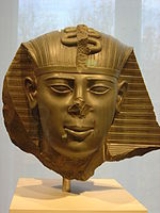
Amasis II
Overview
Pharaoh
Pharaoh is a title used in many modern discussions of the ancient Egyptian rulers of all periods. The title originates in the term "pr-aa" which means "great house" and describes the royal palace...
(570 B.C.E. – 526 B.C.E.) of the Twenty-sixth dynasty of Egypt
Twenty-sixth dynasty of Egypt
The Twenty-sixth Dynasty of Egypt was the last native dynasty to rule Egypt before the Persian conquest in 525 BC . The Dynasty's reign The Twenty-sixth Dynasty of Egypt (also written Dynasty XXVI or Dynasty 26) was the last native dynasty to rule Egypt before the Persian conquest in 525 BC...
, the successor of Apries
Apries
Apries is the name by which Herodotus and Diodorus designate Wahibre Haaibre, Ουαφρης , a pharaoh of Egypt , the fourth king of the Twenty-sixth dynasty of Egypt. He was equated with the Waphres of Manetho, who correctly records that he reigned for 19 years...
at Sais
Sais, Egypt
Sais or Sa el-Hagar was an ancient Egyptian town in the Western Nile Delta on the Canopic branch of the Nile. It was the provincial capital of Sap-Meh, the fifth nome of Lower Egypt and became the seat of power during the Twenty-fourth dynasty of Egypt and the Saite Twenty-sixth dynasty of Egypt ...
. He was the last great ruler of Egypt
Ancient Egypt
Ancient Egypt was an ancient civilization of Northeastern Africa, concentrated along the lower reaches of the Nile River in what is now the modern country of Egypt. Egyptian civilization coalesced around 3150 BC with the political unification of Upper and Lower Egypt under the first pharaoh...
before the Persian
Achaemenid Empire
The Achaemenid Empire , sometimes known as First Persian Empire and/or Persian Empire, was founded in the 6th century BCE by Cyrus the Great who overthrew the Median confederation...
conquest.
Most of our information about him is derived from Herodotus
Herodotus
Herodotus was an ancient Greek historian who was born in Halicarnassus, Caria and lived in the 5th century BC . He has been called the "Father of History", and was the first historian known to collect his materials systematically, test their accuracy to a certain extent and arrange them in a...
(2.161ff) and can only be imperfectly verified by monumental evidence. According to the Greek historian, he was of common origins. A revolt which broke out among native Egyptian soldiers gave him his opportunity to seize the throne.
Discussions

